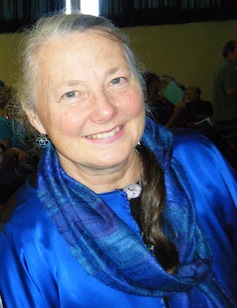
Metamorphic Becomes Metaphoric
By Jennifer GetsingerThirty-five years ago I came to the University of British Columbia to study metamorphic rocks because I thought they were beautiful. Kyanite-staurolite-garnet mica schist is formed from layers of plain old brown mud deposited in ancient oceans, and then squished and folded and recrystallized from the stress of converging continents over tens of millions of years until they become the bling of the geological world of eroded mountains, with silvery flakes of muscovite sparkling in the sunshine, punctuated by round red garnets and elongated blue kyanite crystals. After I got my PhD in geology from UBC, married a Canadian mountaineer, and settled in Vancouver, I returned to a place in the New England Appalachians where my grandmother used to take me at age four to collect garnets and mica. The rock I brought back from there to Vancouver looked exactly like the rocks I had written my graduate theses on, from the North Cascades in Washington and the Cariboo Mountains of British Columbia. Beautiful, long in forming, and long-lasting, such garnet schist has underlain my life with the stability of stone and the knowledge of continuity. The metamorphic rocks of my childhood had become the scientific studies of my adulthood. Metaphorically I had learned that both mountains and people are similar from one part of the world to another.
Glacially carved landscapes and sandy beaches of Vancouver remind me of formative years in my literary home town of Concord, Massachusetts, where I began to write a journal in the 1960s. Long before my geological career, observations of nature worked their way into words written with fountain pen in weathered notebooks. Transcendental thought permeated an education based on reading and writing. The pen still moves across lined pages daily, lapping like thin laminations of silty layers in sedimentary transgressions over land and geological time. Converging cultures and stresses of life choices have changed noted facts into thoughtful meaning. Stories have emerged like refolded anticlines from metamorphism of life experiences, revealing hidden underpinnings, alternate points of view, looking at reality from different angles.
Why Vancouver? It’s a good angle from which to view life and consider geological time.
Priceless views of forested granitic mountains bring us clean water from melted snow, and western breezes freshen the air over tidal saltchuck. Sandy beaches provide open-water swimming to provoke shape-shifting into seal-selves or salmon dreams. Lush forests feed natural imagination and varied settings for life’s dramas, histories, and romances.
My life progressed as geological exploration merged into college teaching and editorial work and writing, always writing something: fiction, poetry, mineral reports, resource articles, essays, and journal entries. The muddy slog through challenging career struggles has gradually metamorphosed into a many-faceted and beautiful retirement of walking, swimming, writing, and gentle living on this Earth.
Vancouver is a fabulous location in which to be a writer. In its moderate weather, one can walk half a day, any day or every day, as Henry Thoreau recommended in Walden, and then write for hours afterwards. Writerly paths can wend through city streets or up a creek. Isolated valleys of nature’s solitude are as easy to access as friendly literary programs, poetry readings, dramatic performances, music festivals, and the human comfort of city activities.
Recently someone in Montreal commented to me that Vancouver is boring, from its rainy weather in winter to its cool weather in summer, from its lack of culture to its unfriendly people. I don’t agree at all. Looking down through its many overlays of cultural waves, its palimpsests of history, its geological stories of glacial sculpting of ancient formations, and its position on an active continental margin, Vancouver is, like the geological book title, a City on the Edge*. Vancouver is a place of change, where yearning can become poetry, where ideas can blow into the mind and make their way into the cultural scene. For me it has been a place where following the thread of ink on paper like a trail through time led to a life transformed through metamorphic rocks to metaphoric thoughts.
